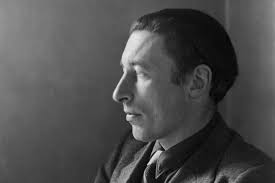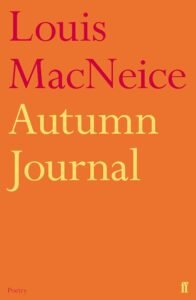
Poet Louis MacNeice wrote a masterpiece that captured 1930s Britain.
Belfast-born Louis MacNeice (1907-1963) tried his hand at all manners of writing. His novels were unsuccessful; his plays not well received. His poetry, however, was something else. It caught the eye of T.S. Eliot, MacNeice’s editor at Faber & Faber. He seemed to have held his own with W.H. Auden, Stephen Spender (a personal friend), and other poets who remain better known from the period. Even today, critics consider his poetry not quite successful (see the biographical listing at the Poetry Foundation). One area of writing where he excelled was in radio plays, and he was a scriptwriter for BBC from 1941 until his death from pneumonia in 1963.
Autumn Journal, published in the spring of 1939, may well be MacNeice’s poetic high-water mark. As the title suggests, it reads like something of a journal, a series of 24 longish poems that sometimes make use of rhyme and sometimes not. Reading it without any preconceived notions (I decided to wait on the biographical and critical accounts until after I’d read it), I found myself pulled into it and quietly brought back to the late 1930s.

Louis MacNeice
My understanding of what came after the work’s publication – World War II started six months later – does not come from taking what I know and “reading into” what MacNeice wrote. He is acutely aware of what is happening in Europe; part of the work is set in Paris and Barcelona, and the crisis over Czechoslovakia is incorporated into the poems.
But the growing specter of war is only part of the story he tells. He describes daily life, local elections, British politics, his education at Oxford, how he and others spend free time, what he sees when he awakes each morning – in short, what his life, loves, experiences, pastimes, thoughts, and opinions are.
And yet, there is this overriding sense of the end of something – it could be the decade, the era between the wars, peace, or how life has been lived. Or all of these things. Something new is beginning, and it may be not entirely welcome.
From XXI

The water has flowed away under the bridge,
The silhouetted lovers have left the ridge,
The flower has closed its calyx.
The crow’s-feet have come to stay,
The jokes no longer amuse, the palate
Rejects milk chocolate and Benedictine –
Yesterday and the day before yesterday.
But oh, not now my love, but oh my friend,
Can you not take it merely on trust that life is
The only thing worth living and that dying
Had better be left to take care of itself in the end?
MacNeice was the youngest son of an Anglican clergyman who would eventually become a bishop in the Church of Ireland. When the boy was seven, his mother died from tuberculosis. After his father remarried, he was sent to school in England. His education focused on the Greek and Latin Classics and literature. He attended Oxford, where he met Auden and worked in the university’s literary culture. After graduation, he worked at the University of Birmingham and the University of London. He wrote a number of novels and plays, but he was known more for his poetry until he began writing radio plays. Throughout his life, he never tried to hide his Irishness; instead, he used it as something of a trademark.
In 1953, MacNeice published a sequel to Autumn Journal, appropriately entitled Autumn Sequel. Critics preferred the original; by this time, tastes had perhaps changed and the 1939 work was viewed more favorably. But MacNeice captured the spirit of that era better than most, and Autumn Journal remains a worthwhile and rather fascinating read.
Related:
10 of the Best Louis MacNeice Poems Everyone Should Read.
Photo by Lukas Schlagenhauf, Creative Commons, via Flickr. Post by Glynn Young.
How to Read a Poem uses images like the mouse, the hive, the switch (from the Billy Collins poem)—to guide readers into new ways of understanding poems. Anthology included.
“I require all our incoming poetry students—in the MFA I direct—to buy and read this book.”
—Jeanetta Calhoun Mish
- Poets and Poems: Donna Vorreyer and “Unrivered” - October 7, 2025
- Poet Sidney Lanier and the Lost Cause - October 2, 2025
- Poets and Poems: A.J. Thibault and “We Lack a Word” - September 30, 2025


Leave a Reply